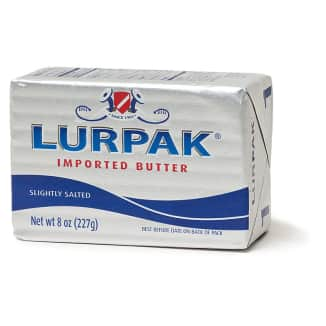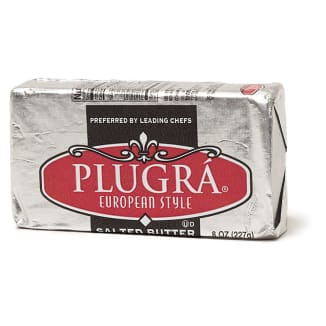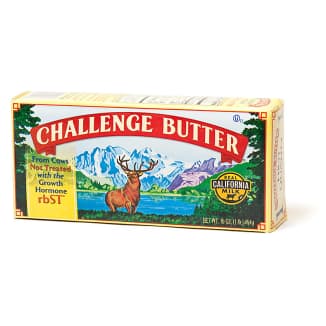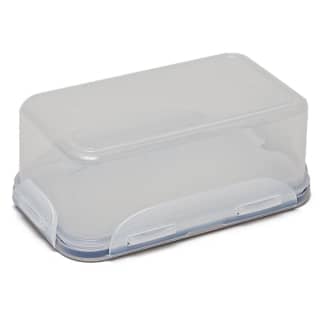Reviews You Can Trust.
See Why.
Salted Butter
There are plenty of butters out there. Could we find one worth its salt?
Top Picks

WinnerLurpak Slightly Salted Butter
This Danish import was “creamy” and “rich,” with “intense butter flavor” and “spot-on salt.” The only product in our lineup made with cultured cream, this “complex,” “flowery” butter had a “sharp,” “crème fraîche” tanginess that our tasters loved.

Best BuyKate's Homemade Butter
This “soft and velvety,” “fresh-tasting” butter from Maine was praised for its “simple, classic” creaminess and “great dairy flavor.” Tasters loved the “markedly salty,” “ocean” notes in this sea-salted butter, which contains the highest percentage of salt in our lineup.
Sign up for the Well-Equipped Cook newsletter
Shop smarter with our ATK Reviews team's expert guides and recommendations.
What You Need to Know
Though we prefer unsalted butter for most recipes because it allows finer control over flavor and texture, most of the butter sold in the United States is salted. We use salted butter as a condiment for foods like corn on the cob, biscuits, or toast when we want extra-salty, savory flavor. Since most of the times we use salted butter are when butter flavor needs to be front and center, we wondered: Is it worth shelling out more for “premium” salted butter?
To find out, we selected six nationally available products and one top-selling regional product (which is available in only 34 states but ranks second in total national sales). We asked 21 America’s Test Kitchen staffers to sample the butters plain, spread on crackers, and melted over toast.
We tallied the scores and found that we liked all the butters we tried, but it was clear that some products were in a league of their own. What set the best butters apart? Since all the products in our lineup have simple ingredient lists of just cream and salt, we looked first into the most obvious variable: salt content. But that yielded no answers—tasters scored products with comparable levels of salt vastly differently.
As we examined nutritional labels, we noticed a handful of lower-ranked products with a shield on their box indicating a “Grade AA” rating by the U.S. Department of Agriculture (USDA). Curious why this label was absent from our favorite butters, we contacted Robert Bradley, professor emeritus of food science at the University of Wisconsin. It’s often rumored that salted butter is made from lower-quality cream than is unsalted butter, but Bradley quickly dismissed that suggestion and said that the USDA doesn’t require manufacturers to grade their butter (or the cream used to make it), and a rating doesn’t necessarily guarantee a better butter. “There’s a lot better cream today going into butter manufacturing than we’ve ever had,” he said. “Handling and storage conditions have greater potential for off-flavor development than the quality of the cream used.”
Bradley confirmed what we learned from previous butter taste tests: Packaging has a huge impact on butter’s flavor potential. “Butter, like any other fat product, is a sponge for off-flavors,” he said. If not properly protected, butter quickly absorbs odors from its surroundings—usually whatever else is in the fridge. The majority of butter is packaged in either foil or wax parchment, with foil offering far greater defense from funky odors. “Parchment does next to nothing in protecting the butter,” Bradley said. “Those wrappers are as porous as a summer screen on your window.”
It wasn’t surprising, then, that the butters wrapped in plain parchment landed at the bottom of our rankings. Tasters detected a number of off, “fridge-y” flavors in these butters even though they were well within their expiration dates. Parchment-wrapped butters also had a harder, cheese-like consistency that contrasted with the airy, almost whipped texture we preferred in our top butters. Because parchment offers minimal protection from moisture loss, butters wrapped this way are likely to harden.
Foil fared much better—four of our top five butters are foil-wrapped and tasters deemed them “fresh” and “clean,” with a “soft,” “rich” texture. The fifth is packaged in a special FlavorProtect wrapper that looks like plain parchment but contains a patented moisture and air barrier that acts like foil. Though it sounds like a marketing gimmick, Bradley told us that it’s actually one of the best wrappers available and remarkably effective at keeping butter fresh. Regardless of packaging, our experts recommend buying butter with an expiration date 4 to 6 months out to minimize storage-related issues.
Not all the funky flavors we noted came from the fridge, though. Tasters were mixed on the “vegetal,” “grassy,” even “barnyard-y” flavors in a few of our lower-ranked products. Most dairy cooperatives don’t require their farmers to pasture-graze their cows, though many farmers may choose to anyway. Of the brands we tried, only two cooperatives claim their butter is made entirely from the milk of cows that are grass-fed for the majority of the year. These butters were herbaceous and earthy but a little too strong for some of our tasters, who favored nuanced, milk-forward butter.
That doesn’t mean that we prefer our butter bland, though. Our favorite product had a rich, creamy texture and a unique tanginess that set it apart. That’s because our favorite is the only butter in our lineup to undergo a process called “culturing.” Tasters overwhelmingly preferred the result—a complex, rich butter with tangy, yogurt-y notes.
So are premium butters worth the price tag? In the end, we couldn’t find a bad butter in the bunch and recommended all seven products in our lineup, but one was clearly cream of the crop. As long as you’re not baking with it (flavor nuances disappear with prolonged heating), our winner is a rich, decadent butter well worth the splurge.
Cook's CountryWatch Now
Everything We Tested
Highly Recommended

WinnerLurpak Slightly Salted Butter
Recommended

Best BuyKate's Homemade Butter

Plugrá European-Style Butter

Land O’Lakes Salted Butter

Kerrygold Pure Irish Butter

Challenge Butter

Organic Valley Salted Butter
*All products reviewed by America’s Test Kitchen are independently chosen, researched, and reviewed by our editors. We buy products for testing at retail locations and do not accept unsolicited samples for testing. We list suggested sources for recommended products as a convenience to our readers but do not endorse specific retailers. When you choose to purchase our editorial recommendations from the links we provide, we may earn an affiliate commission. Prices are subject to change.
Reviews You Can Trust
The mission of America’s Test Kitchen Reviews is to find the best equipment and ingredients for the home cook through rigorous, hands-on testing. Have a question or suggestion? Send us an email at atkreviews@americastestkitchen.com. We appreciate your feedback!
Reviews You Can Trust.
See Why.




